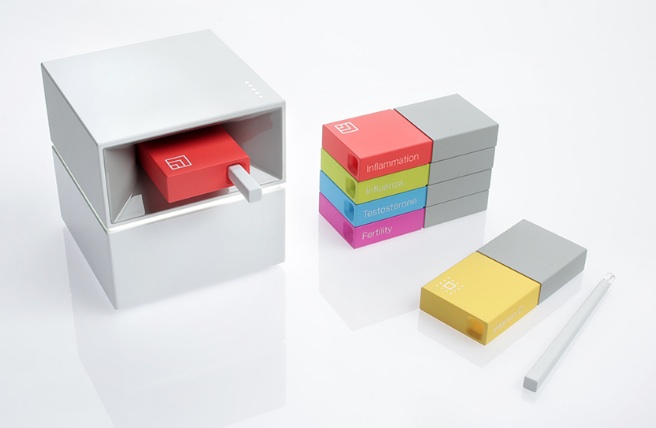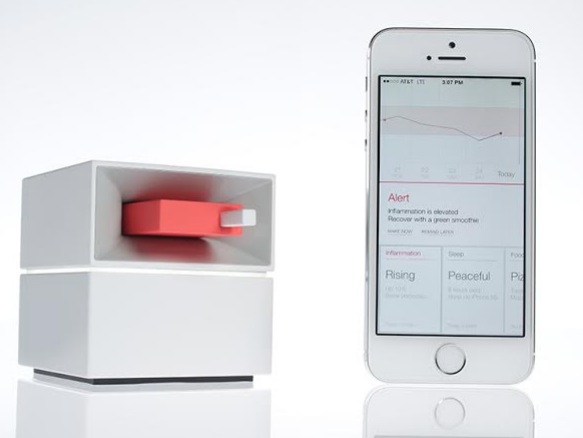 A few weeks ago, when we revisited Eric Topol's top 10 digital health predictions, Topol mentioned microfluidics -- and the ability to create home versions of medical lab tests -- as one of the unexpected breakthroughs of the last five years.
A few weeks ago, when we revisited Eric Topol's top 10 digital health predictions, Topol mentioned microfluidics -- and the ability to create home versions of medical lab tests -- as one of the unexpected breakthroughs of the last five years.
"All the routine labs could be run through the smartphone with a very simple microfluidic adapter — any lab test could," he said at the time. "Then there’s all the ways you can do a physical exam through a smartphone now via mostly medical imaging, whether it is ears, eyes, you name it — all through a smartphone.”
One of the first commercial products to use this technology launched today, San Diego-based Cue. The company's product, also called Cue, is now available for preorder from their website. Cue is a modular at-home lab test, which, using a sample of blood, saliva, or mucus can conduct at home versions of five lab tests (to start with): influenza, testosterone, vitamin D, inflammation, and fertility. The information is then sent via Bluetooth to the user's iOS or Android smartphone. The device is about the size of a Rubik's cube, and the cartridges are about the size of a box of matches.
"We’re very interested in putting the power of the lab into the consumer’s hands in this new way," Clint Sever, Cue founder and Chief Product Officer, told MobiHealthNews. "And to allow them to use their smartphone as the hub for this information that brings in all this other data about their activity and their food to provide them this deeper level of molecular data that can really help people make great choices for their lifestyle."
According to Sever and founder and CEO Ayub Khattak, Cue picked five tests which people already pay for in large numbers, despite the relative inconvenience and expense of getting a lab test done. Testosterone levels are something athletes often want to know about, as well as older men. People are interested in Vitamin D because of its effect on mood -- according Khattak over 70 million Vitamin D tests are ordered each year. Inflammation is both a predictor of heart disease and a counterindicator for intense workouts -- if people detect that they're inflamed, it might be a hint to back off from exercise for a little while. Those three tests, as well as the fertility test, are designed to be done regularly, more like a tracking device than a one-time test.
The influenza test on the other hand, which was the original concept behind the company, is designed to be used by parents or other individuals to check for flu at home, in order to reduce unnecessary doctor visits, especially during an epidemic or a heavy flu season.
 "We’re not intending to replace the doctor, that’s not what we want to do," said Sever. "We want people to have more informed conversations with physicians. A mom, for example, who’s worried her child has flu. She’s able to get the piece of mind she wants by taking that test as soon as the child is sick. And then she can call the physician and have a more informed conversation. And then that doctor can make better decisions based on that information."
"We’re not intending to replace the doctor, that’s not what we want to do," said Sever. "We want people to have more informed conversations with physicians. A mom, for example, who’s worried her child has flu. She’s able to get the piece of mind she wants by taking that test as soon as the child is sick. And then she can call the physician and have a more informed conversation. And then that doctor can make better decisions based on that information."
Cue hopes to expand to other lab tests as time goes on. Khattak said he wasn't allowed to make specific claims about accuracy prior to FDA clearance, but he thinks that the tests have the potential to actually be more accurate than their laboratory counterparts, simply because so much more of the process is automated.
"What we’ve done is we simplified and automated the whole process," he said. "So whereas a lab technician might have 10 steps and they might do 10 of them quite well, those little errors in each of the steps add up. And human error is the largest cause of variation and deviation from standard reproducible results. ... With us it’s one step — you add the sample and then you get your results. You’re taking the human element out of it largely and that’s going to improve accuracy and reproducibility."
Cue's technology is not yet FDA cleared. Like several recent technologies, the company plans to use an investigational device exception to sell some advance copies of the device prior to securing clearance, and then use information from those units for the usability testing required by FDA. The company hopes to ship the pre-sold units by spring 2015. They'll sell for $199, and the eventual retail price will be $300.
Cue was founded in 2009, and is backed in part by an investor group consisting of two UCLA researchers and another private backer, who Khattak declined to name. Aydogan Ozcan, whose company Holomic has done a lot of work related to microfluidics and consumer lab tests, is a professor at UCLA, as was mobile health investor and entrepreneur Dr. Patrick Soon-Shiong.
















